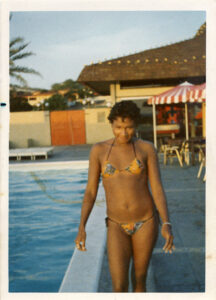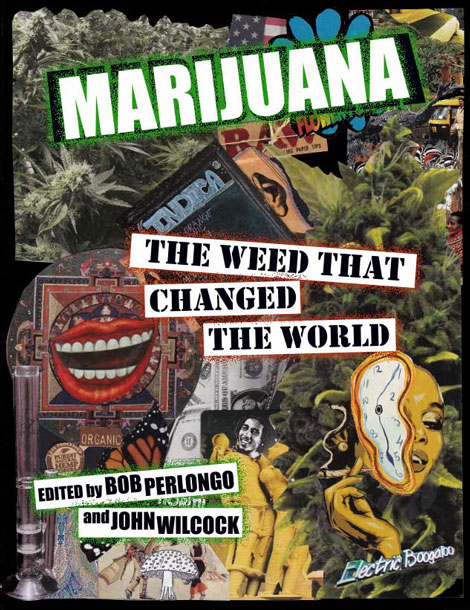
The Column of Lasting Insignificance: November 8, 2014
by John Wilcock
“Police in China can do whatever they want; after 81 days in arbitrary detention you clearly realise that they don’t have to obey their own laws. In a society like this there is no negotiation, no discussion, except to tell you that power can crush you any time they want – not only you, your whole family and all people like you.”
— Ai Weiwei
THERE WERE ALWAYS a few people who didn’t see China’s future would always be in the hands of the Communist party, and the place where the change might start would likely be Hong Kong. With its relatively small population of 7.2 million it must have seeemed like an easily digestible morsel that China could add to its 100 million others although it was recognised that a Hong Kong used to relatively benign British rule was a special case. “One country, two systems” was the reassuring way that Deng Xiaoping optimistically described the new situation when it took place in 1997.
But that was then and now, 20 years later, the Chinese government is expressing the views that it doubtless held—but carefully kept to itself—from the beginning: Hong Kong is indubitably part of China and must fall into line with the rest of the country. “The question now” writes Claude Rosett in the weekly Standard, “is whether China’s president Xi Jinping and his Communist party cohorts will try to calm Hong Kong by acceding to the Democratic demands, or try to crush Hong Kong with force and intimidation”.
Built by refugees from China and their descendants, Hong Kong became one of the world’s great cities, writes Rosett, and he quotes 76-year-old Martin Lee, a barrister and “venerable member” of the territories’ Legislative Council, as saying:”We treasure this place. We treasure particularly the things which cannot be found in China”. Doubtless, what Lee and his supporters had in mind were free elections, open to all, instead of the cynical kind offered by the Communists in which all nominees would have to be approved by Beijing.
At the center of the row is Hong Kong’s (unelected) leader, CY Leung, who has been criticized by student leaders for his scrutiny of candidates who are unlikely to be fans of the Communist party. Locals stress Leun’s “illegitimacy” in pointing out that his election as leader was via 698 votes (out of 1,200) for the election of Hong Kong leaders.
“Many are warning” that the colony’s bid for basic rights “cannot end well”, the Standard says.
AROUND THE TIME I was working for author Albert Goldman I was fortunate to meet a publicity man named Dana who enrolled me in what proved to be a fascinating gig: Traveling in Venezuela, which is the title of the book that resulted from it.
Not long after Venezuela discovered vast, hitherto-unknown sources of oil, the government of Carlos Andres Perez set up a Publications Commission empowered to produce a shelf of books to counter what they felt was a general lack of information about their country. “Isn’t it somewhere near Brazil?” was what more than one bonehead had asked, and with the country’s tourist office such ignorance rankled. Dana had been hired to find somebody suitable to write one of the books about the country, and he found me. The Publications Commission even paid for me to make an exploratory visit, accompanied by Rona as my interpreter. We liked what we saw and on my return I immediately sighed a contract and prepared to go back and work on the book itself.
At this point I met Estela, a hip black teenager with a ring through her nose who claimed to have spent the last few months sharing the back of a huge limousine with a coke dealer. She had been so close to High Times founder Tom Forçade that she had accompanied him, she said, on his honeymoon with Gabrielle. She demanded I take her with me to Venezuela where she proposed to act as translator and when I demurred said she was willing to pay her own way.
It was hardly an opportunity I could afford to pass up, although I was innocently unaware of the sexual demands that would be made by a vigorous teenager, and nonplussed by her threats to tell my friends on my return that I wouldn’t fuck her enough. Looking back now I can hardly credit my low-level performance. But, of course, there was a lot of work to be done and Estela’s need to translate was minimal.
She had summarized her earlier life as an era of “cocks, cunt, coke, cars, and cameras” but declared that now she was 19 it was entirely over. She was quick-witted, highly intelligent and clearly a bundle of erotic energy. On her promise to eschew any drugs whatsoever, I accepted, her generous offer and a few days after arriving in Caracas accompanied my (black) guide to meet her arriving at the airport. The look on his face was memorable as, not surprisingly, the whole trip turned out to be.
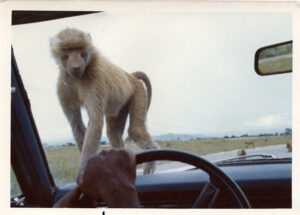 |
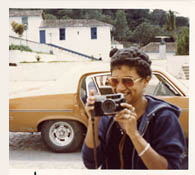
|
|
|
Estela proved to be an amazingly competent and insightful translator. She was shrewd about where we went and the attitudes of the government guides who accompanied us, and the longer the trip lasted the more I realized how hard it would have been to do the book without her. As often as not the tourist people with whom we were traveling would forget that she spoke Spanish and conduct indiscreet conversations in the car about various drug smuggling activities going on around us (although not necessarily their own).
In Venezuela we visited the single most outstanding sight in all my years of traveling: Angel Falls whose uninterrupted plume of water drops 1,840 feet, 11 times the height of Niagara. Named after an American barnstorming pilot Jimmy Angel who crash-landed his plane atop the 3,000ft mesa in 1937, it sits at the end of a 20-mile valley, reachable only after a two-day trip up the river Carrao from Canaima. Airliners bound for Bolivar sometimes make a diversion down the valley and back to give passengers a view of the Falls, but we were flown there by army helicopter. It circled above the river a mile or two from the falls and I wondered nervously what would happen if it came down in this apparent wilderness where only an unbroken blanket of trees would break its fall.
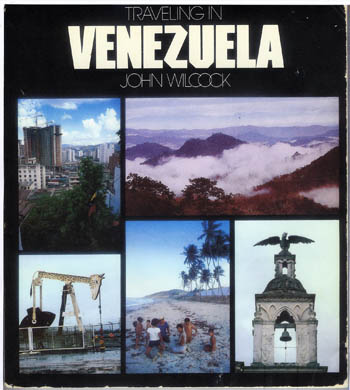
|
But come down it did, in a patch of low brush about the size of a golf tee beside the frothing river. No sooner had we alighted than a woodsman named Fidel Blanco materialized and led us through the woods to his camp, a large structure of poles and canvas with a corrugated iron roof and other poles lashed together to form benches and tables. Several ‘rooms’ created by hanging canvas sheets were where visitors stayed when they came up the river by boat to make the final land trek to the foot of the falls.
Back home in New York, the book completed, it was Estela who first drew my attention to a regular Washington Square performer who called himself the ex-Swami X (“I’m listed in Who’s Who as ‘what’s that?’) and who was always a consummate laugh-getter with that hard-to-please audience. One of his bits most rapturously received concerned how you don’t have to be black to be a nigger, or to be white to be a honky. “A nigger is a man or woman of any color who values truth, love, beauty and freedom above beer, hypocrisy, conformity and the Republican party. The distinction between a Negro and a nigger: a Negro is eating third-class watermelon while a nigger is eating first-class pussy”.
Regrettably, I never saw Estela again. She probably went back to playmates nearer to her own age, and undoubtedly men with more stamina.
*the above excerpt on Venezuela is from my autobiography
Manhattan Memories. Our trip to Venezuela took place in 1978 and I have not heard from or seen Estella since. I wonder where she is now?
—JW
Bakewell (part 2), its mayor, and its pudding…
National Weed (1974, issue #3)
it’s here…

